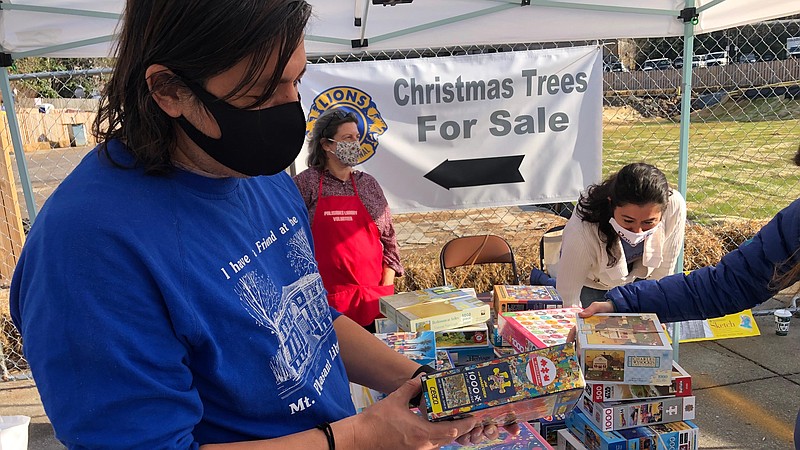WASHINGTON -- Jason Blackson drove across the nation's capital on a recent Sunday to solve a puzzle.
At work, Blackson, a geneticist, scrutinizes DNA to diagnose cervical cancer. But the puzzle he was searching for at the Palisades Farmers Market wouldn't be as complicated. Though he prefers landscapes with lots of color, the choices at the top of one pile were different: a box of doughnuts, cats from around the world and Baby Yoda.
Blackson completes more than 25 jigsaw puzzles each year and was at a D.C. puzzle swap to drop off ones he had conquered -- and to find more.
"When we have one going on the table, it's a nice little conversation piece," Blackson said. "The good thing is that you're trying to find order in chaos."
In the chaos of the pandemic, jigsaw puzzles have proven a relief to those exiled from concerts, movies, sports and indoor dining. The D.C. Puzzle Swap has leaped forward to provide the necessity of semi-mindless distraction.
Crystal Sanchez, who works on digital collections for the Smithsonian Institution's Office of the Chief Information Officer, is a founder of Puzzle Swap, plunging deep into the jigsaw realm during the government shutdown of 2013. She was in search of an "analog, tactile experience" removed from the computer monitors she stares at to earn a living.
"Your brain keeps moving, but it also kind of shuts down," she said of puzzling. "It's not digital. Not being on the screen is helpful."
The group's membership grew after the government shutdown, evolving to facilitate in-person swaps among dozens of puzzle enthusiasts a few times per year. In the pandemic, as Americans were buying out supplies of jigsaw puzzles -- along with toilet paper -- the group evolved again, accommodating contactless porch swaps. In October, the group organized a socially distant swap in the Mt. Pleasant neighborhood of the District of Columbia that drew hundreds of people in a cold rain.
Carlos Izurieta, president of Mt. Pleasant Library Friends, a nonprofit that supports the public library, said people drove from as far as Baltimore, arriving early for choice offerings. Though the friends' group routinely organizes food donations and neighborhood tours, this was different. The Puzzle Swap has a "fan base," Izurieta said.
"People obviously want to get out of their house," he said. "Puzzles have been, for a lot of people, this kind of saving grace. It's something to do that's not necessarily mindless, but you can zone out a little bit."
For Sanchez, it's about more than filling idle time. This is "barter culture" in action, she said.
"Any hobby has the potential to build community," she said. "It's not always easy to do if there isn't infrastructure."
The puzzling community, however, is more particular than some others.
Eileen and husband Mark Vitelli, members of the Puzzle Swap who help plan the group's events, said the couple's "wheelhouse" are puzzles with about 1,000 pieces.
Some puzzlers prefer Ravensburger, the German company with $600 million in annual revenue that serves as a gold standard among jigsaw devotees. But the Vitellis are open to anything "as long as the image is interesting," Eileen said. After all, she is an interior designer.
"We don't want to do a puzzle with a huge area of sky or water," she said. "That's really hard.... Mark is much better at tedious open areas."
Mark, a high school counselor, said puzzles are "a nice quiet thing to do quietly by yourself after heavily interactive job." His strategy: presorting by color.
"There are people who are more masochistic about it," he said.
Sharing jigsaw puzzles does require some ability to withstand disappointment.
Missing pieces are a chronic problem, so much so that Sanchez set aside a "lost pieces jar" in the hope of reuniting orphans with their parent puzzles. Reunions have been happy but few, she said.
"I'm OK doing a puzzle and having a piece missing," she said. "Some people are not ... we don't want people to be unhappy."
Few were unhappy at the Palisades Farmer's Market on a recent Sunday. Toddlers, and golden retrievers, pawed at the puzzles on offer.
Rosa Phelps said she hadn't finished a puzzle in 35 years before she lost her job as a community nurse at the beginning of the pandemic after her organization lost funding. Now, she's all in.
"My neighbor started feeding me puzzles," she said. "I really had an affinity for it. It's like building a mandala. You work, you create it, you appreciate it, and then it's gone."
Abby Horrigan is president of the Friends of the Palisades Library, which organized the swap, an event supported by, but technically independent of, the D.C. Puzzle Swap. (As Sanchez put it: "We're casual.") Horrigan said the transitory nature of puzzles made them ideal for trading.
Like everything in this newly uncertain world, puzzle enthusiasts have to be willing to let their jigsaw puzzles go.
"Once you've done one," Horrigan said, "you don't need to do it again."
